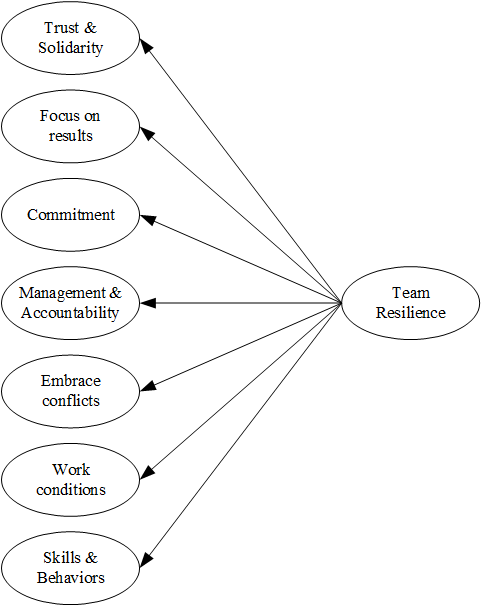Team resilience theory

Team Resilience Theory
Acronym
TRT, TRM
Alternate name(s)
Team Resilience Model
Main dependent construct(s)/factor(s)
Team Resilience
Main independent construct(s)/factor(s)
Trust & Solidarity
Focus on results
Commitment
Management & Accountability
Embrace conflicts
Work conditions
Skills & Behaviors
Concise description of theory
Organizations need well-prepared teams to perform their information systems projects with efficiency and effectiveness.
In such socio-technical systems, project teams’ capability to face and surpass difficulties plays a critical role in organizational reliability.
Hence the relevance of project team resilience, defined as the team’s ability to deal with problems, overcome obstacles, and quickly recover from adverse and possibly harmful situations without collapsing.
The Team Resilience Model explains team resilience in the context of information systems projects, through seven constructs: Trust & Solidarity, Focus on results, Commitment, Management & Accountability, Embrace conflicts, Work conditions, and Skills & Behaviours.
Diagram/schematic of theory
Originating author(s)
J. Varajão, G. Fernandes and A. Amaral (2021)
Seminal articles
Varajão, J., Fernandes, G, & Amaral, A. (2021). Team Resilience Model: An Empirical Examination of Information Systems Projects. Reliability Engineering and System Safety, 206(2021), 107303.
Originating area
Information Systems
Level of analysis
Project team
IS articles that use the theory
Varajão, J., Fernandes, G, & Amaral, A. (2021). Team Resilience Model: An Empirical Examination of Information Systems Projects. Reliability Engineering and System Safety, 206(2021), 107303.
Links from this theory to other theories
NA
External links
[1], Team Resilience Model
